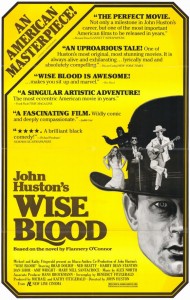“I don’t have to run away from anything, ’cause I don’t believe in anything.”
|

Synopsis:
An angry young veteran (Brad Dourif) returns to his small Southern town determined to decry the hypocrisy of its citizens. After witnessing a supposedly self-blinded preacher (Harry Dean Stanton) and his grown daughter (Amy Wright) passing out religious tracts, Hazel (Dourif) is inspired to start his own church — the Church of Christ Without Christ, “where the blind don’t see and the lame don’t walk and what’s dead stays that way.”
|
|
Genres, Themes, Actors, and Directors:
- Black Comedy
- Deep South
- Harry Dean Stanton Films
- John Huston Films
- Ned Beatty Films
- Religious Faith
Review:
John Huston’s darkly comedic adaptation of Flannery O’Connor’s 1952 novel is a wild ride through a Southern Gothic universe in which quirkiness, corruption, and hypocrisy are the norm. Brad Dourif — with his intense, beady gaze — ably carries the film, keeping us interested in Hazel’s fate even when events take a decidedly downbeat turn; other performances are equally memorable — particularly Amy Wright as a young woman who takes an immediate (sexual) interest in Hazel; Harry Dean Stanton as a “blind” preacher who represents everything Dourif could eventually become; and Dan Shor as a clingy stranger who is inexplicably desperate for Hazel’s approval. Unfortunately, the characters in Wise Blood are ultimately more interesting than the narrative itself, which fails to capitalize on its heady potential: key figures (such as Ned Beatty’s shyster) are barely given enough screen time to register, and Hazel’s Church Without Christ never develops much of a following. Nonetheless, this is enough of an unusual cult favorite to recommend as must-see viewing for all film fanatics.
Redeeming Qualities and Moments:
Must See?
Yes, for its status as a cult favorite. Listed in the back of Peary’s book as a Cult Movie and a Personal Recommendation.
Categories
- Cult Movie
- Important Director
Links:
|
One thought on “Wise Blood (1979)”
A must.
Of the near-50 films Huston (my favorite) directed, maybe only a handful are not really worth checking out. (He’s also among the rare directors whose work as an actor was often intriguing: esp. in great turns like his role in ‘Chinatown’; he’s even one of the few reasons to suffer through ‘Myra Breckenridge’.)
As for ‘Wise Blood’, perhaps no one else could have succeeded in turning O’Connor’s eccentric book into a workable film. (But then, Huston filmed a number of difficult texts: ‘Moby Dick’, my all-time favorite film ‘The Night of the Iguana’, ‘Reflections in a Golden Eye’, ‘Under the Volcano’, ‘The Dead’…) Though short, ‘WB’ is not all that easy a book to read. However, Huston apparently jumped into the material head first and, once inside, embraced the dark humor of the piece fully (I love that he’s credited as ‘Jhon Huston’; note Alex North’s score as well).
Hazel Motes is a character after Huston’s heart; the singular kind of outsider you see throughout his films. Also unsurprising for Huston here is the theme of faith; one can see that theme popping up from time to time in a Huston film as well. What’s unique in that respect here is the film’s radical idea (the best one in the book) of the elimination of the concept of sin. That element, no doubt, piqued Huston’s interest – along with the widespread sham of professed belief mixed with the savagery of evangelism. With its often-intense language (“Jesus is a trick on niggers!”), O’Connor did indeed concoct a potent book; Huston turned it into a compelling piece of art – one which, due to being so hard to come by, has the air of an orphaned child.
As for the acting – as is often the case – Huston is less interested in getting star turns than in getting believable performances that serve his stories; one often thinks his casts really are these people. The same is true here.
All told, ‘WB’ is certainly not among the most accessible of films. It tackles a weighty issue and it begs thought. However, it’s also mordantly funny. You might find yourself scratching your head a bit while watching and laughing – but, as you think on it afterwards, the rewards of the film may very well creep up on you.